We may receive a commission when you make a purchase from one of our links for products and services we recommend. As an Amazon Associate we earn from qualifying purchases. Thank you for support!
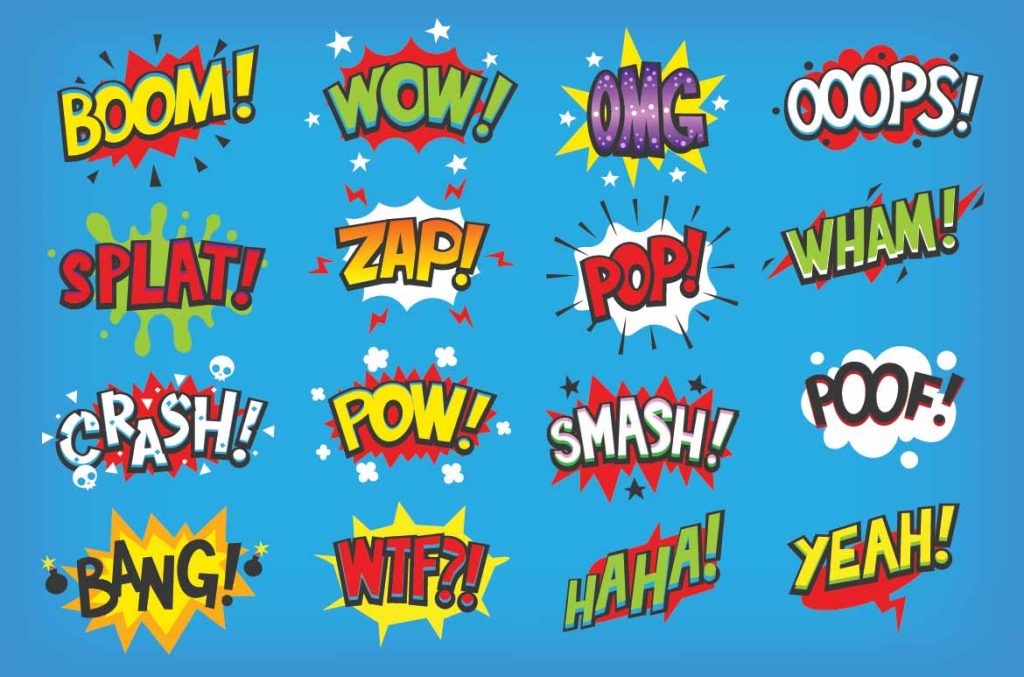
Onomatopoeia is a common literary device to use while writing that many people use every single day – often times without even realizing they are using a form of it!
If you’re curious about onomatopoeia, we will cover the definition of the word, plus give you some examples and a list of onomatopoeia words you can use in your writing!
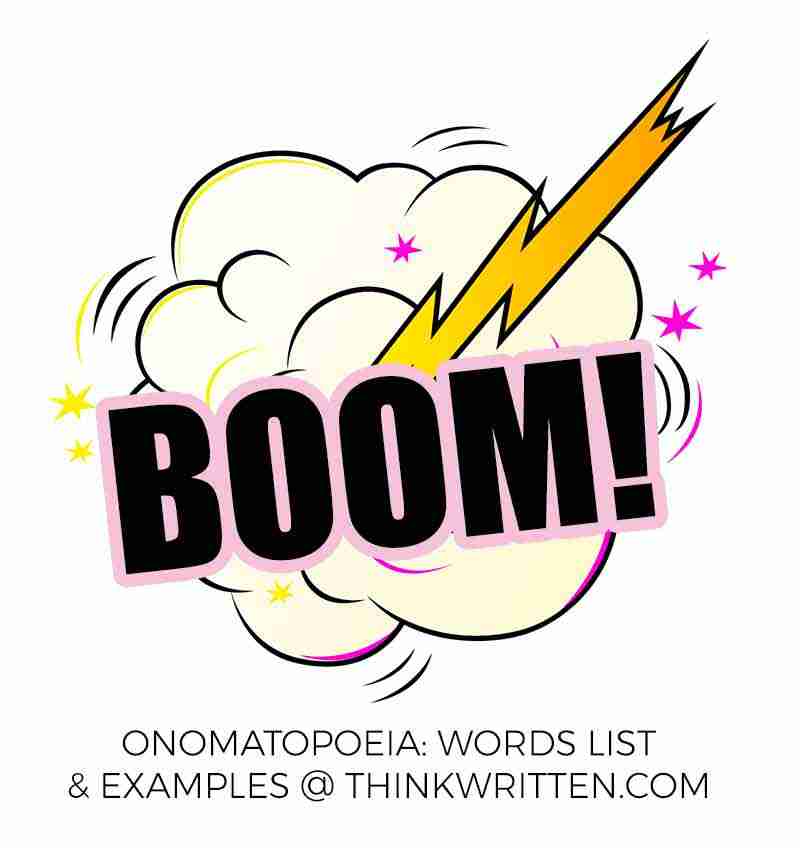
What is Onomatopoeia?
Onomatopoeia at first glance looks like a long word and it may seem to be hard to pronounce and spell. But don’t let that hold you back from using this literary device in your writing – it’s actually a quite basic concept and easy to understand. It’s not scary at all, we promise!
You’ve probably heard of words like “buzz” or “ring” or “bark”. All of these words are sounds. By definition, onomatopoeia is a word the imitates its sound.
Words that imitate a sound can vary depending on regions, countries, and language. For the most part there are plenty of onomatopoeia words to choose from to use in your writing, whether you are writing poetry or an essay or even a novel.
Any word that is used to describe and mimic a sound is an example of the types of words you would want to use in your writing.
You can use onomatopoeia in a number of different styles of writing, but it is most common for descriptive writing, since it is often used to describe the sound that something might make.
However, adding it to other writing styles, such as expository or even persuasive can help you write a stronger piece that will be vividly remembered by those who read the work.
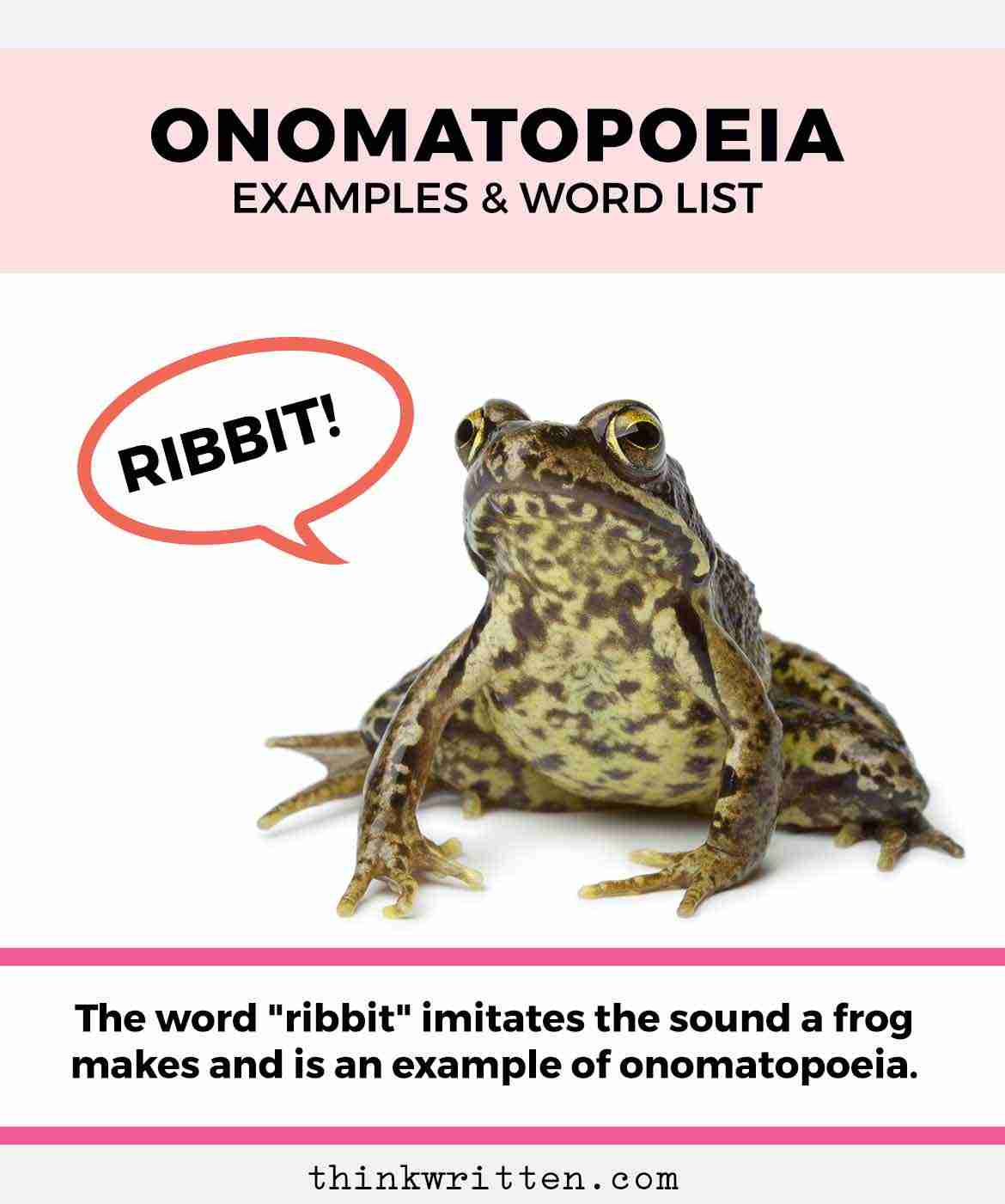
The Big List of Onomatopoeia words :
- Achoo
- Ahem
- Arf
- Arghh
- Bang
- Bark
- Boo
- Brrng
- Bump
- Buzz
- Cackle
- Chatter
- Cheer
- Clap
- Clank
- Click
- Crackle
- Crash
- Crunch
- Ding-Dong
- Drip
- Eek
- Fizz
- Flipflop
- Growl
- Haha
- Hiccup
- Honk
- Howl
- Hush
- Jingle
- Jangle
- Knock
- Lala
- Meow
- Moan
- Moo
- Murmur
- Neigh
- Oink
- Plop
- Poof
- Pop
- Pow
- Psst
- Quack
- Ribbit
- Ring
- Roar
- Rustle
- Rumble
- Shhh
- Sizzle
- Slap
- Smash
- Smack
- Squish
- Swoosh
- Thud
- Thump
- Tick-Tock
- Whisper
- Whimper
- Woof
- Zip
- Zoom
These are likely many words we may have overlooked in this list! It is hard to realize how much we use these words in every single day conversations we might have!
Do you see the many ways these words can be used to make your writing more descriptive? Each of these words make it very easy to imagine the sounds and visualize a specific scene.
Now that you understand the basic meaning of onomatopoeia and have a list of words to use, you have all that you need to start using these words in your writing!
Famous Examples of Onomatopoeia
[sc name=”disclosure”]
There are many authors who are well known for their use onomatopoeia. Many examples can be found simply by reading a couple of Dr. Suess books, one popular book being this one: Mr. Brown Can Moo, Can You? – such a fun book to read!
The Edgar Allen Poe poem The Raven is another example which uses words that mimic a sound.
Which examples of onomatopoeia can you spot in the excerpt below?
Once upon a midnight dreary, while I pondered, weak and weary,Over many a quaint and curious volume of forgotten lore—While I nodded, nearly napping, suddenly there came a tapping,As of some one gently rapping, rapping at my chamber door.“’Tis some visitor,” I muttered, “tapping at my chamber door—Only this and nothing more.”
Additional Examples of Onomatopoeia in Use for Poems & Poetry
Would you like to see some examples of Onomatopoeia in use? Here are some poetry verses we wrote specifically to inspire you to learn how to use words that mimic sounds in your writing!
Game Time
The crowd roars
over the swoosh of the ball
through the net
so loud you might miss –
the thud of it falling
to the floor.
The Sound of Happy
What is the sound of happy?
Is it hands clapping?
Is it the thump of you heart in your chest?
Is it the zoom of the planes overhead?
Is it a good haha?
Or the absence of a boo-hoo-hoo?
What is the sound of happy to you?
Why Should I Use Onomatopoeia in my writing?
The biggest reason you might want to use this popular literary device that uses words which mimic a sound while writing is because it adds a lot of sensory description to your writing. These types of words appeal to the senses, which is a great way to help you connect to your readers.
Because the word mimics a sound, it also helps paint a better visual picture in your audience’s minds. This is especially helpful when writing for children as an audience for your book!
Using words that imitate a sound can also help you show and not tell in your writing. This is very important when you are writing a novel, as you want your readers to stay engaged and interested. This can also help your readers connect to your character better.
When you are writing poetry, you can have a lot of fun with these words! These types of words give you endless ideas and inspiration for different types of things to write about! In fact, we actually include many ideas for onomatopoeia in several of our writing prompts on this website!
How Will You Use Onomatopoeia in Your Writing?
I hope you find these tips on ways to use onomatopoeia in your writing and poetry helpful. What will you write that is fun and uses words that mimics a sound? Do you think that using these types of words might help you improve your writing in any way?
And – we need your help! We’ve thought of as many words that mimic a sound as we can think of. Can you think of any words we might have missed that we should include in our onomatopoeia list? Or – comment below with an example sentence that uses one of the words on our list.
Most importantly, I hope you have fun with writing with these word examples – and of course we’d love to hear any additional thoughts and ideas you may have in the comments section below!


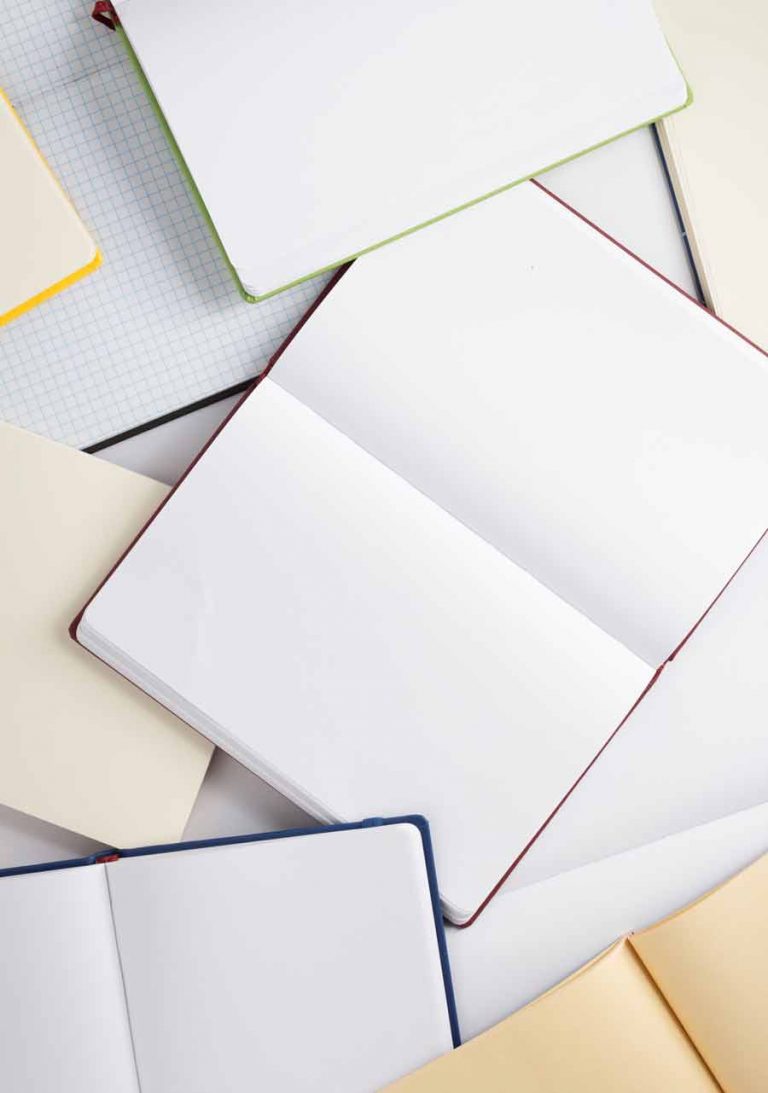

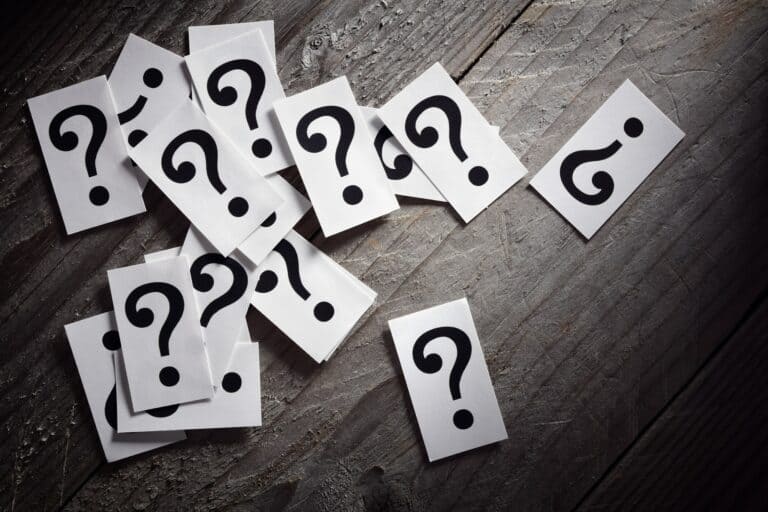


try boing, kapow, and snort
Love to explore thru writing picture books for kids with some poetry in it. I will always refer to thinkwritten.com. Thank you very much
Thanks Carmelita!
What onomatoepoeic word describes, “it’s only Halloween”?
Thanks for this its really nice but some more examples would really help
yes, i agree. im writing a paper and we are supposed to incorperate onomatopoeia.i can’t even spell that. help.
Here is the spelling ~~~
Onomatopoeia.
Good Luck !!!
add creak. also add more examples please.
Can someone please tell me an onomatopoeia word that would describe Maxwell Kane in the novel Freak the Mighty.
Add splish and splash
Bubbling Mud is described as BLOOP BLOOP
Don’t forget that words like zig zag are also onomatopoeic as the words suggest the meaning, though not necessarily a sound.
I am writing a picture book about scissors and cloths. Any onomatopoeia words for cloth cut by scissors? Thank you.
Ones that are close might be snip, rip, tear.
Snick, snip, shink, clip, clink, snap, shnick
Can an onomatopoeia be a one-word sentence? For example:
Clink!
I heard clicking from the back of my closet.
Usually, I italicize it, add an exclamation point, and write onomatopoeias like this:
Clink-clink-clink!
Am I doing this right?
Hi Jojo, a sentence can be one word long. Part of creative writing is to learn the basic punctuation and grammar rules and then bend and break them!
Readers can be led to hear what you hear with adroitly awkward wordage, also alliterative allegories, lingering lazily along likable strings, or just use abrupt interrupters.
ka-ching ka-ching ka-chink ker-plink ker-plunk
ratchet ratchet ratchet raising, rising upward, upward
sculptuously scrape, scroll, and scoop scrumptous ice cream
scratch a scratch an itch and scratch a scratch a scratch a.
step step stop step step stop
stoop stare step step step
whir whir whirling twir twir twirling
whooshing waving, wafting whisps so softly, swirling swirling
OH. I LOVE WRITING!
cool
His fingers scrabbled deeper into his desk drawer for something–anything to write the long sequence of numbers before he would forget.
Her broken fingernails scrabbled to grasp branches and roots as she slid toward the swollen river.
The furious scrabbling of claws growing louder caused the mouse to flee for his life.
How bout ‘gwish’? Or ‘snik zort crik pok paf’?
I love the WTF part
How are “wow”, “omg” or “wtf” onomatopoeias?
Hi Kyle! wow, omg and wtf are spelled exactly as they sound – wow – for the acronyms we spell out each letter individually, so W-T-F. Great question, thanks for stopping by!